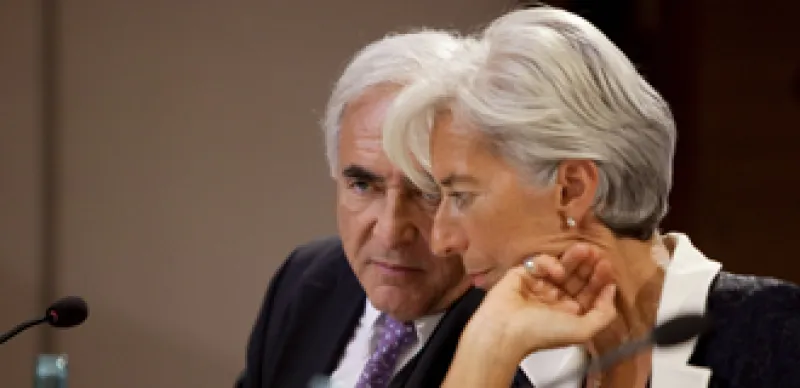In an interview with Institutional Investor Editor Tom Buerkle, French Finance Minister Christine Lagarde shares her views on the depth and severity of the European debt crisis.
Institutional Investor: Can you give me your personal sense of the recent European debt crisis, both in terms of the weaknesses in the construction of economic and monetary union and the capacity of Europe to react?
Christine Lagarde: Well, it could have been the collapse of Europe. It certainly could have been the collapse of the euro. But although it took a bit more time than we would have hoped, I think it was equally a transformational moment for Europe.
By a combination of the European Central Bank doing a lot more than what it had hoped and was structured to do, and the sheer political will of most governments to actually close ranks, face reality, put money where their mouth was and be prepared to transgress a little bit what was initially contemplated by the founders of the euro zone, we managed to overcome that major risk.
The euro zone was set up with the caveat that all members would abide by the Stability and Growth Pact rules on deficits and debt. But clearly what happened in 2004 was a major event: Both Germany and France got away with larger deficits, larger debt, and noncompliance with the pact. In a way, Germany and France in 2004 almost wrote the script of what could have happened in 2010; that is, potential collapse.
The no-bailout rule was inserted in the Maastricht Treaty at Germany’s insistence. What do you make of the fact that Germany effectively violated that clause to set up the European Financial Stability Facility?
The fact that they were prepared to participate in this intergovernmental facility was a major flexibility because initially the German side was saying, “Well, it has to be optional.” I think it’s a realization by the German authorities that we’re in it together. It’s our common good. We have to defend the currency. And all of us, including France and Germany, which did what they did in 2004, we have to be very strict about our rules, about the rules of the club.
Where do you think things stand now? Do you think you’ve restored a fair amount of stability with the actions in May and the bank stress tests?
I think it’s going to continue being a constant challenge. If I look at Greece, for instance, it’s going to be a constant exercise to check that Greece is actually delivering against the commitment that it made to respect the conditions [of the euro area loans].
Second, we realized that we had focused almost exclusively on deficits and debt, and we had left to the side the issue of competitiveness. So those matters will need to be subsets of the Stability and Growth Pact so that we can effectively check and verify that we are improving competitiveness, that we are building business models that are sustainable and not like Spain or Ireland, very sensitive to a turnaround of the international environment.
And third, very important, at national level as well as at the European level, we have to make sure that we all deliver on our commitment to reduce deficits.
Deficit rules weren’t enforced in 2004. Why will it be different this time?
Two elements are critical: One is time, one is threat.
On the time issue, we were just way too slow. The excessive deficit procedure is just too long-drawn out over time. Acceleration is of the essence because markets move much faster than our procedure allows for.
Threat: There has to be enough of a sanction and enough quasi-automaticity. The procedure needs to be quick and sanctions must apply unless there is a qualified majority to oppose it. You shift the burden of proof, in a way. At the moment, there must be a majority to support sanctions.
At the end of the day, you must squeeze where it hurts. And if you ask member states to deposit money from their own budget into an interest-bearing account that will actually be frozen and under the custody of the Commission or the member states unless and until decisions are made and implemented to reduce the deficit, I think that’s likely to be effective.
Is there a risk that to resolve these intra-euro zone imbalances, you’re basically going to have a German euro zone, depressing demand and putting a greater emphasis on exports as the sole way out?
I hope we are heading toward a more balanced model, where we complement each other rather than leverage on those weaknesses. The first priority for all of us is clearly to significantly reduce our public deficit without strangling the fragile growth that we have. It’s a balancing act that is complicated, like sailing into the wind. As a second priority, we need to stimulate growth so that we create jobs. We want to keep people off the streets. To that end, we need to use all three engines; export, yes, but also consumption and investment.
To assume that Germany can just push a button to restore consumption I think proceeds from a misconception of Germany and its history. My colleague, Wolfgang Schäuble, tried to explain that at the last G-20. For the German citizen to consume, he or she needs to feel confident that its public finances are in order.
Otherwise, they will keep saving.
What kind of permanent mechanism does Europe need after the European Financial Stability Facility expires in 2012 to give the euro zone the capacity to deal with future crises? And should it include a provision for restructuring sovereign debt, as Germany has proposed?
Everybody understands that we have to have in place a crisis management mechanism. But it’s a debate that we need to have in due course, in peace and serenity. There is no restructuring debate at the moment. And I think we don’t want to confuse all the issues.
I was fortunate to be living here in Paris in the ‘90s when France had its first female prime minister. Now I hear speculation that someone else might be moving to Matignon. Would you welcome that?
No. I’m not looking for promotion. I’m looking to deliver on the commitment we’ve made. And 2011 is going to be a huge challenge because France will be chairing the G-8 and the G-20, which will keep me very, very busy, unless the president decides otherwise.
Can you talk about priorities for the G-20?
The three priorities that the president has identified are the International Monetary order: Do we have what it takes in the 21st century to actually avoid volatility and have a balanced system.
Number two, the whole issue of market regulation, which I think we have progressed a big way in the financial sector, needs to be looked at in the commodity sector as well. Raw materials of all sorts, including CO2 quotas and agricultural products, will be on his agenda in a big way.
And the third will probably be the appropriate representation of all players, not only in the G-20 circle but also, how do we need to change institutions to make sure that they reflect the rebalancing and reshuffling of the cards around the world.






